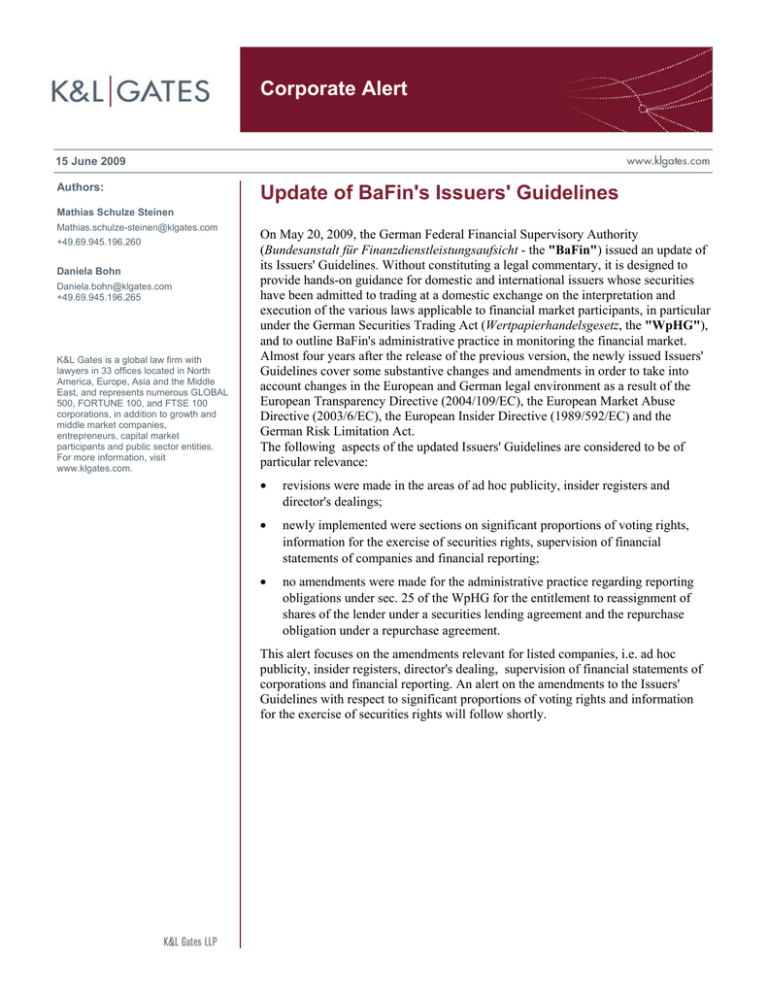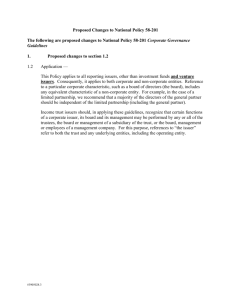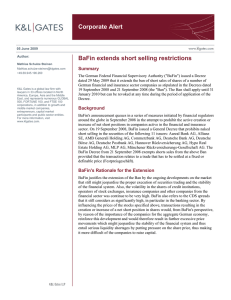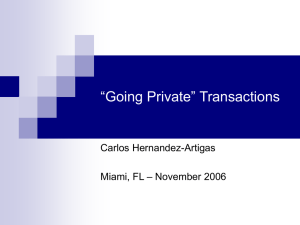
Corporate Alert
15 June 2009
Authors:
Update of BaFin's Issuers' Guidelines
Mathias Schulze Steinen
Mathias.schulze-steinen@klgates.com
+49.69.945.196.260
Daniela Bohn
Daniela.bohn@klgates.com
+49.69.945.196.265
K&L Gates is a global law firm with
lawyers in 33 offices located in North
America, Europe, Asia and the Middle
East, and represents numerous GLOBAL
500, FORTUNE 100, and FTSE 100
corporations, in addition to growth and
middle market companies,
entrepreneurs, capital market
participants and public sector entities.
For more information, visit
www.klgates.com.
On May 20, 2009, the German Federal Financial Supervisory Authority
(Bundesanstalt für Finanzdienstleistungsaufsicht - the "BaFin") issued an update of
its Issuers' Guidelines. Without constituting a legal commentary, it is designed to
provide hands-on guidance for domestic and international issuers whose securities
have been admitted to trading at a domestic exchange on the interpretation and
execution of the various laws applicable to financial market participants, in particular
under the German Securities Trading Act (Wertpapierhandelsgesetz, the "WpHG"),
and to outline BaFin's administrative practice in monitoring the financial market.
Almost four years after the release of the previous version, the newly issued Issuers'
Guidelines cover some substantive changes and amendments in order to take into
account changes in the European and German legal environment as a result of the
European Transparency Directive (2004/109/EC), the European Market Abuse
Directive (2003/6/EC), the European Insider Directive (1989/592/EC) and the
German Risk Limitation Act.
The following aspects of the updated Issuers' Guidelines are considered to be of
particular relevance:
•
revisions were made in the areas of ad hoc publicity, insider registers and
director's dealings;
•
newly implemented were sections on significant proportions of voting rights,
information for the exercise of securities rights, supervision of financial
statements of companies and financial reporting;
•
no amendments were made for the administrative practice regarding reporting
obligations under sec. 25 of the WpHG for the entitlement to reassignment of
shares of the lender under a securities lending agreement and the repurchase
obligation under a repurchase agreement.
This alert focuses on the amendments relevant for listed companies, i.e. ad hoc
publicity, insider registers, director's dealing, supervision of financial statements of
corporations and financial reporting. An alert on the amendments to the Issuers'
Guidelines with respect to significant proportions of voting rights and information
for the exercise of securities rights will follow shortly.
Corporate Alert
Ad hoc notifications
The WpHG imposes a statutory requirement on
listed companies to notify the market of insider
information. If companies fail to disclose the insider
information or if they provide the information too
late, false or incomplete, BaFin is entitled to
intervene and to impose sanctions. The purpose of
the ad hoc disclosure is to prevent other market
participants are put at a disadvantage compared to
company insiders and to equalize the information
level and transparency in the market. Ad hoc
publicity is also an important tool against the abuse
of insider information.
Information qualifies as insider information, and
must be disclosed by the issuer immedi-ately, i.e., ad
hoc, (i) if it contains specific facts about the issuer
(ii) it is not public knowledge, (iii) if such
information has the potential to influence the market
price of the securities, and (iv) if it relates directly to
the issuer. However, the question whether a certain
fact qualifies as insider information and whether,
and when, it must be included in an ad hoc
disclosure can only be determined on the basis of
experience and comparison with other cases.
Therefore, companies are well advised to adhere to
the cases and explanations provided by BaFin in the
Issuers' Guidelines.
In addition to the examples provided, BaFin clarifies
in the new Issuers' Guidelines that:
•
circumstances which will highly likely occur in
the future can qualify as insider information;
•
insider information must be specific with a
potential influence on the trend of the market
price;
•
information has a potential influence on the
market price if a judicious investor would take
this information into account when making an
investment decision;
•
as a matter of principle, there is no direct
relation to the issuer in the case of general
market data, purchase and sales agreements as
well as decisions of supervisory authorities;
•
exemptions and particularities must be
considered in relation to financial instruments
such as bonds, participating certificates and
certified derivatives.
The latest amendments to the paragraph on ad hoc
publicity relate to the exemption defined in sec. 15
(3) of the WpHG. An exemption requires that (i)
non-disclosure is necessary to protect the legitimate
interests of the issuer, (ii) there is no misleading of
the public, and (iii) confidentiality of the
information can be secured. The Issuers' Guidelines
explain that legitimate interests exist, in particular,
if ongoing negotiations may be affected or the
approval of another corporate body of the company
is outstanding. According to BaFin, making use of
an exemption requires an express decision of the
managing directors or a disclosure committee
formed by the management board. The argumentum
e contrario here is that if insider information has not
been published immediately and representatives
have not made a resolution on the exemption from
the ad hoc disclosure, this will be an in-fringement
of sec. 15 of the WpHG, even if there was a
theoretical possibility of an exemption.
If information qualifies as insider information and
no exemption applies, the ad hoc disclosure must be
published Europe-wide via electronic information
platforms, posted on the website of the issuer and
submitted to the German Company Register. In
addition, BaFin must be notified of the disclosure
by submitting the document together with the
publication certificate.
Director's Dealing
If capital markets are to be transparent, market
participants must have an idea of when members of
the managing and supervisory board of listed
companies are dealing in their company's own
shares (director's dealing). Therefore, sec. 15a of the
WpHG requires members of the management and
supervisory board of the issuer, as well as other persons with regular access to insider information who
are entitled to make important managerial decisions
(the "Director"), to notify both the issuer and
BaFin of any dealings in the company's own shares
within five working days. This also applies to
associated persons, i.e., spouses, registered civil
partners, dependent children and other relatives
living in the same household for at least one year. In
order to prevent circumvention of sec. 15a of the
WpHG, legal entities, such as establishments acting
in a fiduciary capacity and partnerships that are
15 June 2009
2
Corporate Alert
dealing in the company's shares, may also be subject
to the disclosure re-quirement. Circumstances that
will trigger the disclosure requirement for legal
entities are: (i) the Director is a member of the
management or supervisory board of the legal entity,
(ii) the Director has a share of a minimum of 50
percent in the legal entity, (iii) the Director holds a
minimum of 50 percent of the voting rights, or (iv) a
minimum of 50 percent of the entity's profits are
allocated to the Director, provided that the Director
directly or indirectly controls the legal entity or
performs managerial tasks in the legal entity.
Pursuant to the statutory law, the Director must
disclose all transactions in relation to the stocks of
the issuer, or any other financial instruments, to the
issuer and BaFin. BaFin provides the following
specific examples of transactions that trigger/do not
trigger the disclosure requirements according to its
administrative practice:
•
Acquisition of financial instruments on the basis
of an employee's contract, a gift or an
inheritance will not trigger the notification
obligation. The acquisition of stocks in
connection with participation in an employees
program, however, is subject to disclosure;
•
Granting of options that are issued to
shareholders in connection with a capital increase do not require disclosure. Trading of
options, on the other hand, must be disclosed;
•
Transactions in connection with trust
agreements trigger a disclosure obligation of the
trustor, not the trustee.
As a matter of principle, there is, however, no
reporting requirement if the total sum of all
transactions done by the Director is below Euro
5,000 by the end of a calendar year.
The issuer must send details of the reportable
transactions immediately to the media for Europewide dissemination, i.e., press agencies, news
providers, print media, websites for the financial
market or electronic information websites. The
company may decide in each individual case which
media it will use as long as the Europe-wide
dissemination can be secured. In addition, the issuer
must forward the information immediately to the
Company Register and provide BaFin with the
publication document.
Financial Reporting Enforcement
Since early 2005, when accounting control was
implemented by the German Act on Accounting
Control (Bilanzkontrollgesetz), the accounting
practices of listed companies have been subject to
external monitoring, supplementing the internal
audit function. The external monitoring process,
known as financial reporting enforcement, applies
to the companies' financial statements from
December 31st, 2004 onwards. Reacting to
international accounting scandals, it is intended to
strengthen investors' confidence in the accuracy of
financial statements. Consequently, the new
accounting control procedure is supposed to secure
that financial reporting of issuers will be controlled
at least once every five years. BaFin added a new
chapter to its Issuers' Guidelines that provides some
explanations to the enforcement procedure and
gives some guidance on the interpretation of the
new regulations.
Subject to the examination procedure are the latest
approved accounts. They will be examined as to
whether they comply with the statutory financial
reporting requirements. As regards German
companies, financial reporting requirements of the
German Commercial Act, the German Stock
Corporation Act, International Financial Reporting
Standards (IFRS) for consolidated accounts as well
as European Directives apply. As regards foreign
companies, IFRS, US-GAAP as well as all
applicable national reporting requirements must be
taken into account.
In order to strengthen the enforcement of
accounting rules, the German Act on Accounting
Control introduced a two-tier procedure:
(1) The German Financial Reporting Enforcement
Panel (FREP) (Deutsche Prüfstelle für
Rechnungslegung DPR e.V.) examines individual
and consolidated financial statements (i) on a
random sampling basis, (ii) with cause if there are
concrete indications of an infringement of financial
reporting requirements, or (iii) at the request of
BaFin. Abbreviated financial statements and interim
management reports are subject to examination only
with cause.
15 June 2009
3
Corporate Alert
(2) BaFin comes in at the second level if (i) a
company does not participate willingly in the
examination or does not agree with the findings of
the examination, or (ii) if there are substantial doubts
about whether the findings of the examination are
correct or the examination was conducted properly.
It should be noted that proceedings will only end on
the first level if a company agrees with all the
findings of the examination. If a company does not
agree with the examination in parts, BaFin will
conduct its own examinations to the fullest extent,
which can result in a high administrative fee for
examinations and also deviation in the examination
results to the disadvantage of the company.
Infringements of financial reporting requirements
require publication of the major findings of the
examination and the corrected accounts, which may
only be avoided if there is no public interest in the
publication or if the company can prove a legitimate
interest, i.e., possibly in existence threatening or
clear bagatelle cases, whereas negative impact on
the market price is not sufficient. In the Issuers'
Guidelines, BaFin takes the view of the German
legislator that bagatelle cases will qualify as an
infringement of the accounting rules but will not
require correction of the accounts. However, due to
a recent precedent of the Higher Court of Frankfurt,
which decided that bagatelle cases will not qualify
as an in-fringement, there remains some uncertainty
about dealing with bagatelle cases in the future.
The Issuers' Guidelines also provide a detailed
explanation of the cooperation between BaFin and
other national or international authorities with
respect to the enforcement procedure, i.e.,
circulation of information and data, as well as legal
protection against measures of BaFin.
Financial Reporting
Provisions on financial reporting, which are laid
down in sec. 37v et seq. of the WpHG, require
publicly traded companies to prepare annual
financial statements and half-yearly financial reports
as well as interim management statements, or,
alternatively, quarterly financial reports. The
regulations have been introduced by the
Transparency Directive Implementation Act
(Transparenzrichtlinie-Umsetzungsgesetz) which
implemented the guidelines set by the European
Transparency Directive (2004/109/EG). A new
chapter in the Issuers' Guidelines provides a useful
checklist regarding timing and scope of financial reporting.
As a matter of principle, issuers must meet the
following financial reporting requirements:
•
Publish an announcement on the internet stating
the date and the exact address of the webpage
on which the accounting documents are being
made publicly available. According to BaFin,
the documents must be posted directly on the
indicated webpage or, at least, must be
accessible by just one link,
•
Notify BaFin of the publication of the
announcement and pass the announcement to
the Company Register (Unternehmensregister),
and
•
Publish the complete accounting documents on
the webpage and submit the documents to the
Company Register in order to be stored there.
Particularities in relation to financial reporting
requirements apply to short fiscal years where the
end of the fiscal year does not correspond with the
relevant publication period. Annual financial
statements must include, in any event, (i) audited
accounts, (ii) an annual report, and (iii) a
compliance statement (Bilanzeid) pursuant to the
German Commercial Act. The compliance
statement has to be issued by the company's legal
representatives who declare that, to their best
knowledge, the financial statements and the report
include a fair view on the development and
performance of the company and the position of the
group as well as a description of important events
that have occurred during the reporting period and
the impact of such events as well as a forecast in
this respect.
Publication of annual financial statements on the
website must be made publicly available at the latest
four months upon the end of the financial year,
whereas half-yearly financial statements must be
published within two months upon the end of the
half year. BaFin recommends publishing the
announcement about one week prior to the
publication of the statements.
15 June 2009
4
Corporate Alert
The WpHG also requires that companies publish an
interim management report that sets out the
development of the business activities during the
reporting period. An exemption applies where
companies issue quarterly financial statements in
accordance with the requirements of the WpHG.
Different from the other financial reporting, this
report only relates to the past.
Anchorage Austin Beijing Berlin Boston Charlotte Chicago Dallas Dubai Fort Worth Frankfurt Harrisburg Hong Kong London
Los Angeles Miami Newark New York Orange County Palo Alto Paris Pittsburgh Portland Raleigh Research Triangle Park
San Diego San Francisco Seattle Shanghai Singapore Spokane/Coeur d’Alene Taipei Washington, D.C.
K&L Gates is a global law firm with lawyers in 33 offices located in North America, Europe, Asia and the Middle East, and represents numerous
GLOBAL 500, FORTUNE 100, and FTSE 100 corporations, in addition to growth and middle market companies, entrepreneurs, capital market
participants and public sector entities. For more information, visit www.klgates.com.
K&L Gates comprises multiple affiliated partnerships: a limited liability partnership with the full name K&L Gates LLP qualified in Delaware and
maintaining offices throughout the U.S., in Berlin and Frankfurt, Germany, in Beijing (K&L Gates LLP Beijing Representative Office), in Dubai,
U.A.E., in Shanghai (K&L Gates LLP Shanghai Representative Office), and in Singapore (K&L Gates LLP Singapore Representative Office); a
limited liability partnership (also named K&L Gates LLP) incorporated in England and maintaining offices in London and Paris; a Taiwan general
partnership (K&L Gates) maintaining an office in Taipei; and a Hong Kong general partnership (K&L Gates, Solicitors) maintaining an office in Hong
Kong. K&L Gates maintains appropriate registrations in the jurisdictions in which its offices are located. A list of the partners in each entity is
available for inspection at any K&L Gates office.
This publication is for informational purposes and does not contain or convey legal advice. The information herein should not be used or relied upon
in regard to any particular facts or circumstances without first consulting a lawyer.
©2009 K&L Gates LLP. All Rights Reserved.
15 June 2009
5





